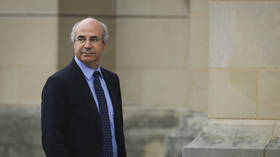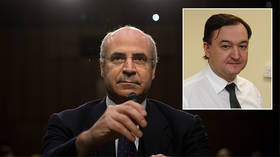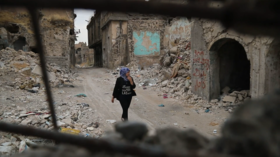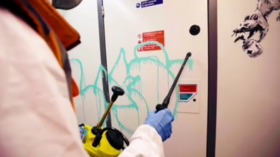The real Bill Browder story: What US/UK media won’t tell you about billionaire lobbyist’s dubious narrative

If anyone has proven the adage that “a lie can travel halfway around the world while the truth is still putting on it shoes,” it’s Bill Browder. The mega-rich vulture capitalist has been spinning a yarn for years.
Intriguingly, after Germany’s leading news magazine kiboshed his fake narrative, Anglo-American media ignored the revelations.
Browder’s narrative suits the US/UK establishment as it provides a convenient excuse to sanction Russia, but the story has more holes than Swiss cheese.
The billionaire vulture capitalist has been a figure of some prominence on the world scene for the past decade. A few months back, Der Spiegel published a major exposé on him and the case of Sergei Magnitsky, but the US/UK mainstream media failed to follow it up and so, aside from Germany, few people are aware of Browder’s background.
Browder had gone to Moscow in 1996 to take advantage of the privatization of state companies by then-Russian President Boris Yeltsin. Browder founded Hermitage Capital Management, a Moscow investment firm registered in offshore Guernsey in the Channel Islands. For a time, it was the largest foreign investor in Russian securities. Hermitage Capital Management was rated as extremely successful after earning almost 3,000 percent in its operations between 1996 and December 2007.
During the corrupt Boris Yeltsin years, with his business partner’s US$25 million, Browder amassed a fortune. Profiting from the large-scale privatizations in Russia from 1996 to 2006, his Hermitage firm eventually grew to $4.5 billion.
When Browder encountered financial difficulties with Russian authorities, he portrayed himself as an anti-corruption activist and became the driving force behind the Magnitsky Act, which resulted in economic sanctions aimed at Russian officials. However, an examination of Browder’s record in Russia and his testimony in court cases reveal contradictions with his statements to the public and Congress, and raises questions about his motives in attacking corruption in Russia.
Also on rt.com Russia to impose reciprocal sanctions on UK following publication of ‘Magnitsky List’Although he has claimed that he was an ‘activist shareholder’ and campaigned for Russian companies to adopt Western-style governance, it has been reported that he cleverly destabilized companies he was targeting for takeover. Canadian blogger Mark Chapman has revealed that after Browder would buy a minority share in a company, he would resort to lawsuits against this company through shell companies he controlled. This would destabilize the company with charges of corruption and insolvency. To prevent its collapse, the Russian government would intervene by injecting capital into it, causing its stock to rise—with the result that Browder’s profits would rise exponentially.
Later, through Browder’s Russian-registered subsidiaries, his accountant Magnitsky acquired extra shares in Russian gas companies such as Surgutneftegaz, Rosneft and Gazprom. This procedure enabled Browder’s companies to pay the residential tax rate of 5.5 percent instead of the 35 percent that foreigners would have to pay.
However, the procedure to bypass the Russian presidential decree that banned foreign companies and citizens from purchasing equities in Gazprom was an illegal act. Because of this and other suspected transgressions, Magnitsky was interrogated in 2006 and later in 2008. Initially he was interviewed as a suspect and then as an accused. He was then arrested and charged by Russian prosecutors with two counts of aggravated tax evasion committed in conspiracy with Bill Browder in respect of Dalnyaya Step and Saturn, two of Browder’s shell companies to hold shares that he bought. Unfortunately, in 2009, Magnitsky died in pre-trial detention because of a failure by prison officials to provide prompt medical assistance.
Browder has challenged this account and for years he has maintained that Magnitsky’s arrest and death were a targeted act of revenge by Russian authorities against a heroic anti-corruption activist.
It’s only recently that Browder’s position was challenged by the European Court of Human Rights, which in its ruling on August 27, 2019 concluded that Magnitsky’s “arrest was not arbitrary, and that it was based on reasonable suspicion of his having committed a criminal offence.” And as such, “The Russians had good reason to arrest Sergei Magnitsky for Hermitage tax evasion.”
“The Court observes that the inquiry into alleged tax evasion, resulting in the criminal proceedings against Mr Magnitskiy, started in 2004, long before he complained that prosecuting officials had been involved in fraudulent acts.”
Prior to Magnitsky’s arrest, because of what Russia considered to be questionable activities, Browder had been refused entry to Russia in 2005. However, he did not take lightly his rebuff by the post-Yeltsin Russian government under Vladimir Putin. As succinctly expressed by Professor Halyna Mokrushyna at the University of Ottawa:
[Browder] began to engage in a worldwide campaign against the Russian authorities, accusing them of corruption and violation of human rights. The death of his accountant and auditor Sergei Magnitsky while in prison became the occasion for Browder to launch an international campaign presenting the death as a ruthless silencing of an anti-corruption whistleblower. But the case of Magnitsky is anything but.
Despite Browder’s claims that Magnitsky died as a result of torture and beatings, authentic documents and testimonies show that Magnitsky died because of medical neglect – he was not provided adequate treatment for a gallstone condition. It was negligence typical at that time of prison bureaucracy, not a premeditated killing. Because of the resulting investigation, many high-level functionaries in the prison system were fired or demoted.
For the past 10 years, Browder has maintained that Magnitsky was tortured and murdered by prison guards. Without any verifiable evidence he has asserted that Magnitsky was beaten to death by eight riot guards over 1 hour and 18 minutes. This was never corroborated by anybody, including by autopsy reports. It was even denied by Magnitsky’s mother in a video interview.
Nevertheless, on the basis of his questionable beliefs, he has carried on a campaign to discredit and vilify Russia and its government and leaders.
In addition to the ruling of the European Court of Human Rights, Browder’s basic underlying beliefs and assumptions are being seriously challenged. Very recently, on May 5, 2020, an American investigative journalist, Lucy Komisar, published an article with the heading Forensic photos of Magnitsky show no marks on torso:
On Fault Lines today I revealed that I have obtained never published forensic photos of the body of Sergei Magnitsky, William Browder’s accountant, that show not a mark on his torso. Browder claims he was beaten to death by prison guards. Magnitsky died at 9:30pm Nov 16, 2009, and the photos were taken the next day.
Later in her report she states:
I noted on the broadcast that though the photos and documents are solid, several dozen U.S. media – both allegedly progressive and mainstream — have refused to publish this information. And if that McCarthyite censorship continues, the result of rampant fear-inducing Russophobia, I will publish it and the evidence on this website.
Despite evidence such as this, till this day Browder maintains that Sergei Magnitsky was beaten to death with rubber batons. It’s this narrative that has attracted the attention of the US Congress, members of parliament, diplomats and human rights activists. To further refute his account, a 2011 analysis by the Physicians for Human Rights International Forensics Program of documents provided by Browder found no evidence he was beaten to death.
In his writings, as supposed evidence, Browder provides links to two untranslated Russian documents. They were compiled immediately after Magnitsky died on November 16, 2009. Recent investigative research has revealed that one of these appears to be a forgery. The first document, D309, states that shortly before Magnitsky’s death: “Handcuffs were used in connection with the threat of committing an act of self-mutilation and suicide, and that the handcuffs were removed after thirty minutes.” To further support this, a forensic review states that while in the prison hospital, “Magnitsky exhibited behavior diagnosed as ‘acute psychosis’ by Dr. A. V. Gaus at which point the doctor ordered Mr. Magnitsky to be restrained with handcuffs.”
The second document, D310, is identically worded to D309 except for a change in part of the preceding sentence. The sentence in D309 has the phrase “special means were” is changed in D310 to “a rubber baton was.”
As such, while D309 is perfectly coherent, in D310 the reference to a rubber baton makes no sense whatsoever, given the title and text it shares with D309. This and other inconsistencies, including signatures on these documents, make it apparent that D310 was copied from D309 and that D310 is a forgery. Furthermore, there is no logical reason for two almost identical reports to have been created, with only a slight difference in one sentence. There is no way of knowing who forged it and when, but this forged document forms a major basis for Browder’s claim that Magnitsky was clubbed to death.
The fact that there is no credible evidence to indicate that Magnitsky was subjected to a baton attack, combined with forensic photos of Magnitsky’s body shortly after death that show no marks on it, provides evidence that appears to repudiate Browder’s decade-long assertions that Magnitsky was viciously murdered while in jail.
With evidence such as this, it repeatedly becomes clear that Browder’s narrative contains mistakes and inconsistencies that distort the overall view of the events leading to Magnitsky’s death.
Despite Magnitsky’s death, the case against him continued in Russia and he was found guilty of corruption in a posthumous trial. Actually, the trial’s main purpose was to investigate alleged fraud by Bill Browder, but to proceed with this they had to include the accountant Magnitsky as well. The Russian court found both of them guilty of fraud. Afterwards, the case against Magnitsky was closed because of his death.
After Browder was refused entry to Russia in November of 2005, he launched a campaign insisting that his departure from Russia resulted from his anti-corruption activities. However, the real reason for the cancellation of his visa that he never mentions is that in 2003, a Russian provincial court had convicted Browder of evading $40 million in taxes. In addition, his illegal purchases of shares in Gazprom through the use of offshore shell companies were reportedly valued at another $30 million, bringing the total figure of tax evasion to $70 million.
Also on rt.com Bill Browder points finger at Bernie Sanders on Magnitsky Act vote, but the real story is his own corruptionIt’s after this that the Russian federal government next took up the case and initially went after Magnitsky, the accountant who carried out Browder’s schemes.
But back in the US, Browder portrayed himself as the ultimate truth-teller, and embellished his tale by asserting that Sergei Magnitsky was a whistleblowing “tax lawyer,” rather than one of Browder’s accountants implicated in tax fraud. As his case got more involved, he presented a convoluted explanation that he was not responsible for bogus claims made by his companies. This is indeed an extremely complicated matter and as such only a summary of some of this will be presented.
The essence of the case is that in 2007, three shell companies that had once been owned by Browder were used to claim a $232 million tax refund based on trumped-up financial loses. Browder has stated that the companies were stolen from him, and that in a murky operation organized by a convicted fraudster, they were re-registered in the names of others. There is evidence, however, that Magnitsky and Browder may have been part of this convoluted scheme.
Browder’s main company in Russia was Hermitage Capital Management, and associated with this firm were a large number of shell companies, some in the Russian republic of Kalmykia and some in the British Virgin Islands. A law firm in Moscow, Firestone Duncan, owned by Americans, did the legal work for Browder’s Hermitage. Sergei Magnitsky was one of the accountants for Firestone Duncan and was assigned to work for Hermitage.
An accountant colleague of Magnitsky’s at Firestone Duncan, Konstantin Ponomarev, was interviewed in 2017 by Komisar, who said:
According to Ponomarev, the firm – and Magnitsky — set up an offshore structure that Russian investigators would later say was used for tax evasion and illegal share purchases by Hermitage… the structure helped Browder execute tax-evasion and illegal share purchase schemes.
He said the holdings were layered to conceal ownership: The companies were ‘owned’ by Cyprus shells Glendora and Kone, which, in turn, were ‘owned’ by an HSBC Private Bank Guernsey Ltd trust. Ponomarev said the real owner was Browder’s Hermitage Fund. He said the structure allowed money to move through Cyprus to Guernsey with little or no taxes paid along the way. Profits could get cashed out in Guernsey by investors of the Hermitage Fund and HSBC.
Ponomarev said that in 1996, the firm developed for Browder ‘a strategy of how to buy Gazprom shares in the local market, which was restricted for foreign investors.’
In the course of their investigation, on June 2, 2007, Russian tax investigators raided the offices of Hermitage and Firestone Duncan. They seized Hermitage company documents, computers and corporate stamps and seals. They were looking for evidence to support Russian charges of tax evasion and illegal purchase of shares of Gazprom.
In a statement to US senators on July 27, 2017, Browder stated that Russian Interior Ministry officials “seized all the corporate documents connected to the investment holding companies of the funds that I advised. I didn’t know the purpose of these raids so I hired the smartest Russian lawyer I knew, a 35-year-old named Sergei Magnitsky. I asked Sergei to investigate the purpose of the raids and try to stop whatever illegal plans these officials had.”
Contrary to what Browder claims, Magnitsky had been his accountant for a decade. He had never acted as a lawyer, nor did he have the qualifications to do so. In fact, in 2006, when questioned by Russian investigators, Magnitsky said he was an auditor on contract with Firestone Duncan. In Browder’s testimony before the Senate Judiciary Committee in 2017, he claimed Magnitsky was his lawyer, but in 2015, in his testimony under oath in the US government’s Prevezon case, Browder told a different story, as will now be related.
On Browder’s initiative, in December 2012, he presented documents to the New York District Attorney alleging that a Russian company, Prevezon, had “benefitted from part of the $230 million dollar theft uncovered by Magnitsky and used those funds to buy a number of luxury apartments in Manhattan.” In September 2013, the New York District Attorney’s office filed money-laundering charges against Prevezon. The company hired high-profile New York-based lawyers to defend themselves against the accusations.
"Although Browder has been a willing interview in the press, getting him to make his case under oath has been a story in its own right." Watch Bill Browder take off running when served with a subpoena to testify under oath (after a Daily Show appearance). https://t.co/lOFjLgVDOXpic.twitter.com/Oh7sFYaQ6D
— Max Blumenthal (@MaxBlumenthal) July 16, 2018
As reported by Der Spiegel, Browder would not voluntarily agree to testify in court, so Prevezon’s lawyers sent process servers to present him with a subpoena, which he refused to accept and was caught on video literally running away. In March 2015, the judge in the Prevezon case ruled that Browder would have to give testimony as part of pre-trial discovery. Later, while in court and under oath and confronted with numerous documents, Browder was totally evasive. Lawyer Mark Cymrot spent six hours examining him, beginning with the following exchange:
Also on rt.com Russian court orders arrest of UK investor Bill Browder over organization of criminal networkCymrot asked: Was Magnitsky a lawyer or a tax expert?
He was “acting in court representing me,” Browder replied.
And he had a law degree in Russia?
“I’m not aware he did.”
Did he go to law school?
“No.”
How many times have you said Mr. Magnitsky is a lawyer? Fifty? A hundred? Two hundred?
“I don’t know.”
Have you ever told anybody that he didn’t go to law school and didn’t have a law degree?
“No.”
Critically important, during the court case, the responsible US investigator admitted during questioning that his findings were based exclusively on statements and documents from Browder and his team. Under oath, Browder was unable to explain how he and his people managed to track the flow of money and make the accusation against Prevezon. In his 2012 letter that launched the court case, Browder referred to “corrupt schemes” used by Prevezon, but when questioned under oath, he admitted he didn’t know of any. In fact, to almost every question put forth by Mark Cymrot, Browder replied that he didn’t know or didn’t remember.
Like this story? Share it with a friend!















